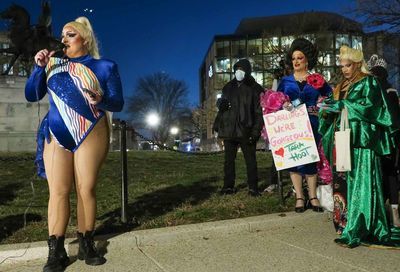Film Review: Jurassic World: Fallen Kingdom
Jurassic World: Fallen Kingdom trades theme park thrills for gothic chills, but it’s still not enough

It’s quite a thing to sit in a cinema and watch a film work through its own identity crisis. That’s perhaps the best way to describe the 128 minutes of Jurassic World: Fallen Kingdom (![]()
![]()
![]()
![]()
![]() ), a film that wants to be all things to all people without ever really knowing what to settle on. It’s a sequel to 2015’s billion-dollar theme park romp, an homage to the 1993 Steven Spielberg original, a serious film about ethics, a lighthearted action comedy, and a tense thriller. And if that wasn’t enough, it needs to lay the groundwork for another sequel, set to hit theatres in June 2021. It’s a tall order for any film to meet.
), a film that wants to be all things to all people without ever really knowing what to settle on. It’s a sequel to 2015’s billion-dollar theme park romp, an homage to the 1993 Steven Spielberg original, a serious film about ethics, a lighthearted action comedy, and a tense thriller. And if that wasn’t enough, it needs to lay the groundwork for another sequel, set to hit theatres in June 2021. It’s a tall order for any film to meet.
What’s surprising about Fallen Kingdom is that, despite its many disparate elements, it manages to be more enjoyable than the scattered and gratuitous film that came before it. And that’s despite turning the dino-meddling up to eleven. In this new iteration, confidently directed by J. A. Bayona (A Monster Calls), the former Jurassic World theme park on Isla Nublar is facing imminent destruction, as the island’s long dormant volcano suddenly reawakens. Humanity is thus faced with an interesting dilemma: invest the funds to rescue the remaining dinosaurs that roam the remnants of the park, or leave the animals to return to their former extinction.
In the three years since their former place of work was overrun by a Tyrannosaurus, Claire (Bryce Dallas Howard) has started an activist group dedicated to saving the dinos and Owen (Chris Pratt) has retreated into the woods. When Claire is contacted by Benjamin Lockwood (James Cromwell) — former partner of the original films’ John Hammond, who developed the cloning technology — and his assistant Eli (Rafe Spall) to retrieve some of the dinosaurs for a new sanctuary, it’s back to the island we go, with Owen tagging along to find Blue, the trained Velociraptor from the first film.
Naturally, everything quickly goes to hell — something that will come as no surprise to anyone who has seen the movie’s trailer. Isla Nublar quickly turns volcanic and, shock of shocks, the people Owen and Claire are working for aren’t really the good guys. What follows is Fallen Kingdom’s most bombastic, and arguably most gripping set piece, as everyone runs for the boat to escape imminent death. It’s no surprise that Bayona maintains tight control over this sequence, given he handled the incredible tsunami scene from 2012’s The Impossible, but it’s hard not to marvel at the spectacle as the island turns to liquid fire and dinosaurs rampage in a desperate, and sadly futile, bid to save themselves from pyroclastic flow. There’s even a pretty powerful emotional coda, as the ship sails away.
What’s perhaps more surprising is that, after offering big scale thrills, Fallen Kingdom pivots into tense, tight horror, bringing the cast and their dinosaurs to Lockwood’s gothic mansion. Here, it holds closer to the original Jurassic Park films, putting the dinosaurs into tight focus, making the peril more immediate, and turning the whole thing into one giant slaughterhouse as various species run rampant — none more so than this film’s version of Indominus rex, a genetically modified monster that wrecked the last film’s theme park. Indoraptor, as it’s known, is tougher, smarter, more trainable. It will viciously hunt its prey until they are safely tucked inside its stomach. The plan, we learn, is to sell it to the highest bidders as a weapon.

The problem is that, while Indoraptor makes for a fearsome enemy, the film falls into the exact same pitfall that brought down the theme park in the first film. There, Indominus was created to satiate an audience’s desire for bigger, badder dinosaurs. Here, Indoraptor serves the same purpose, but in fourth-wall breaking fashion. When a dinosaur all but winks to the camera before killing someone, something’s not quite right. Watching what is being billed as the second most intelligent creature on the planet (after humans, though that’s not a universal truth) slowly open a window and stalk a child should be terrifying, but instead it feels almost cartoonish, because we know this isn’t how dinosaurs work. It’s all for our pleasure.
Fallen Kingdom has other problems. For one, its screenplay continues to take itself far too seriously, while failing to back it up with meaningful writing. There’s ruminations about the ethics and morals of bringing these animals back, or letting them die out again, or meddling in genetics to create variations of variations, but it’s all hampered by clunky dialogue. That said, Pratt and Howard shine in their lead roles, Pratt especially so. Howard once again finds herself perilously close to damsel in distress, though the film at least makes a pointed note of showing that she isn’t running around in high heels this time, and gives her a ludicrous — but deserved — moment to be the hero. Justice Smith and Daniella Pineda as tech wiz Franklin and dinosaur vet Zia, Claire’s activist colleagues who end up at Lockwood’s estate, add some fun into the mix, while Isabella Sermon powers through a hammy accent to shine as Maisie Lockwood, Benjamin’s granddaughter, who Indoraptor really wants to turn into dinner.
Jurassic World: Fallen Kingdom is above all else a popcorn movie, a big, summer blockbuster to get lost in for a couple of hours. Its main problems occur when it tries to reach beyond its means and tackle serious, difficult questions. Instead, it works best when it stops trying to be all things to all people — when the characters shut up, the lights go out, the camera pans in tight on a sweaty, shaking face, and the sound of a nearby dinosaur trembles in their ears. There, it brings the audience roaring back to the wonder, the horror and the thrill of Spielberg’s original. That’s worth the ticket price alone.
Jurassic World: Fallen Kingdom is rated PG-13 and opens Friday, June 22, in area theatres. Visit fandango.com.
Support Metro Weekly’s Journalism
These are challenging times for news organizations. And yet it’s crucial we stay active and provide vital resources and information to both our local readers and the world. So won’t you please take a moment and consider supporting Metro Weekly with a membership? For as little as $5 a month, you can help ensure Metro Weekly magazine and MetroWeekly.com remain free, viable resources as we provide the best, most diverse, culturally-resonant LGBTQ coverage in both the D.C. region and around the world. Memberships come with exclusive perks and discounts, your own personal digital delivery of each week’s magazine (and an archive), access to our Member's Lounge when it launches this fall, and exclusive members-only items like Metro Weekly Membership Mugs and Tote Bags! Check out all our membership levels here and please join us today!





















You must be logged in to post a comment.